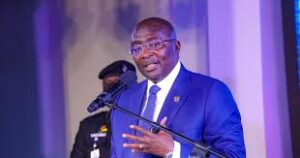Cedi Appreciation Drives GH¢150bn Drop in Public Debt — President

President John Mahama has announced a significant drop of GH¢150 billion in Ghana’s public debt over the past five months, crediting the decline to prudent fiscal management and a marked appreciation of the national currency, the cedi.
Speaking at the African Development Bank (AfDB) Annual Meetings held in Abidjan, President Mahama highlighted the strides made in Ghana’s economic recovery and outlined a clear path toward achieving long-term debt sustainability.
“Our recent fiscal measures are starting to pay off,” he said. “The cedi has shown strong signs of recovery, which has helped reduce our total debt burden considerably. In just five months, we’ve seen a reduction of almost GH¢150 billion — a major milestone in our economic reform efforts.”
He explained that the currency’s performance has helped ease the cost of debt servicing, especially in foreign-denominated obligations, by strengthening Ghana’s purchasing power and improving macroeconomic stability.
Debt Restructuring Nears Completion
The President noted that the country’s debt restructuring programme is nearly finalized, with 97% of negotiations concluded. Only a small fraction, involving commercial creditors, remains unresolved.
“Our bilateral agreements earlier this year were instrumental in bringing our debt-to-GDP ratio down,” Mahama said. “We’re now in a strong position to meet our medium-term target of reducing debt levels to between 55% and 58% of GDP by 2028—potentially even sooner if current trends continue.”
He emphasized that future borrowing would focus exclusively on projects with clear returns on investment. “We must ensure that any new debt we incur directly supports productivity and growth. We are prioritising infrastructure that generates revenue, such as tolled highways and logistics corridors,” he stated.
Driving Regional Trade Through Infrastructure
President Mahama also stressed the importance of physical infrastructure in enabling the full potential of the African Continental Free Trade Area (AfCFTA). He warned that unless regional connectivity improves, the goals of intra-African trade will remain out of reach.
“A free trade agreement is only meaningful if we can move goods efficiently across borders,” he noted. “That means investing in railways, highways, ports, and aviation routes that link our economies.”
He pointed to Ghana’s recent port expansions as a case in point, describing how deep-water capabilities at the country’s major ports now allow them to accommodate the largest cargo ships in the region. “With a draft depth of 16 metres, our ports can serve as a key redistribution hub for goods headed to and from destinations like Cameroon, Angola, Namibia, and Senegal.”
Local Value Addition and Trade Barriers
Addressing the cocoa industry, Mahama celebrated Ghana’s progress in increasing domestic processing, noting a rise from 25% to 40% of cocoa being processed locally. He acknowledged Côte d’Ivoire’s leadership in the sector, which now processes around 50% of its cocoa.
However, he also warned that African nations continue to face non-tariff barriers and skewed trade systems that disadvantage them in global markets. “Even when we increase local processing, we are confronted with export restrictions and technical requirements that serve as veiled protectionism,” he remarked.
Building Africa’s Economic Power
Mahama called for greater collaboration between African nations to address these inequities and build a more united front in trade negotiations. In particular, he highlighted the potential of joint strategies between Ghana and Côte d’Ivoire to create resilient value chains in key sectors like cocoa, mining, and textiles.
“We can no longer wait for fairness to be handed to us,” he said. “We must work together to create it. AfCFTA is our best opportunity to build economic strength from within.”
Concluding his address, President Mahama offered a strong message of empowerment: “The world does not respect complaints—it respects strength. If Africa wants to be heard, it must act boldly. It’s time we harness our potential and take control of our economic destiny.”






